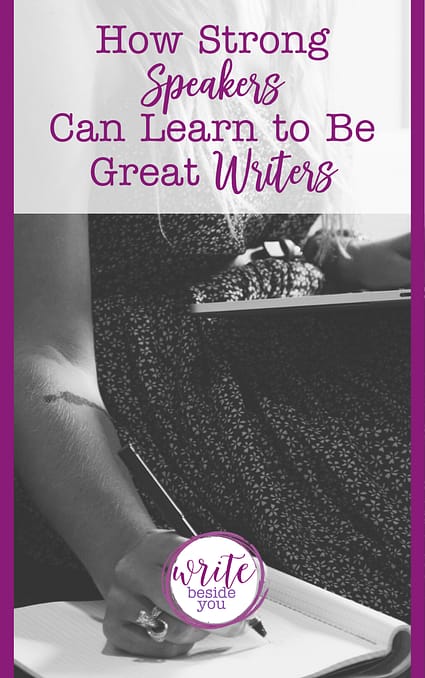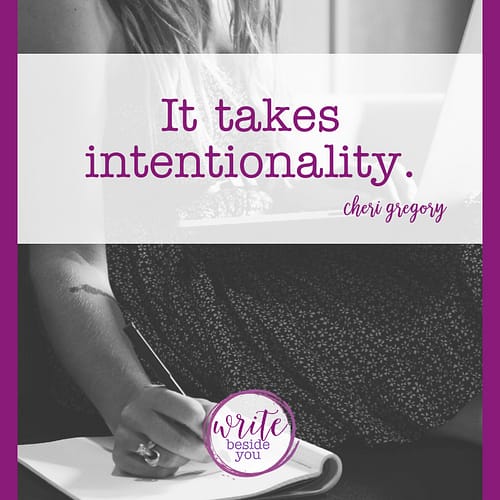How Strong Speakers Can Learn to be Great Writers
“You write just like you speak!”
It’s the Ultimate Compliment. And for over a decade, I’ve heard people say it to Kathi.
They told her so often, and I agreed with them so completely, that I accepted it as fact.
So when it came time to write our most recent co-authored book Overwhelmed, I was feeling pretty smug about my fail-proof plan for this book to “write itself.”
- Kathi and I would schedule multiple Skype sessions to talk through the content.
- We’d have the audio files transcribed.
- Voila! A book that would make even more people gush, “You write just like you speak!”
But then?
I discovered the inconvenient truth:
NOBODY writes just like they speak.
Not even Kathi Lipp.

3 techniques for translating your speaking into writing
Although speaking and writing both involve words, they are quite different forms of communication. Here are three specific practices that will help you write “just” (or at least more) like you speak.
1. Grab your readers’ attention from the start.
When you step on stage to deliver a message, your audience is already there. Short of a crisis, they will stay seated. You can start with a long, rambling story about yourself and get away with it. After all, you’re right there, in front of your audience, captivating them with your physical presence, gestures, tone of voice, pacing, and pauses. Even if you throw in a ton of unnecessary details and hop down a dozen rabbit trails, your listeners will stick with you.
Readers won’t.
You don’t have the luxury of a “captive audience” when you’re writing. Readers can close your site, delete your Email, and shut your book halfway
through the first paragraph–or sentence.
Hook your reader from the start and never let them go.
A well-crafted hook tantalizes your reader, riveting their attention to your next sentence, next paragraph, and next page.
It’s not your reader’s responsibility to stay interested in what you’ve written.
It’s your job to keep them interested.
2. Use spacing to indicate pacing.
(The paragraph below demonstrates a fast pace. When words and sentences are all put together in a single paragraph, we tend to speed up as we read.)
Think about what makes a powerful speaker so effective: Sense of humor? Sure. Passion for their topic? Sure. Emotional connection with you (even though you’re sitting in the back row)? Sure. All of the above? Absolutely!
(Notice how the exact same words below feel slower because of the spacing.)
Think about what makes a powerful speaker so effective:
Sense of humor?
Sure.
Passion for their topic?
Sure.
Emotional connection with you (even though you’re sitting in the back row?)
Sure.
All of the above?
Absolutely!
(Don’t worry about pacing during your first draft. But when revising, read your piece aloud and ask yourself, “Where do I want to speed up? Slow down? Stall? Stop?” Then use spacing to indicate pacing.)
3. Seek immediate feedback.
One of the great benefits of speaking to a live audience is immediate feedback.
When you crack a joke, they laugh. You make an important point, they say “Ohhhhhhh!” When you tell a moving story, they reach for Kleenex. If their eyes start glazing over, you can make adjustments on the fly.
Strong speakers can become great writers by seeking immediate audience feedback on their early drafts.
So start building your feedback team.
- Get yourself a writing buddy and swap drafts. Daily.
- Join a critique group.
- Connect with a writing coach.
- Enroll in an interactive writing workshop.
- Build a message development team.
Do whatever it takes to surround yourself with people who know you, your heart, your message, and your voice. Teach them how to give you useful feedback. And develop a rhythm of running your drafts by them regularly.
What the Ultimate Compliment really means
“You write just like you speak!” is high praise.
It means that the experience of reading your writing matches the experience of listening to you speak.
This doesn’t come naturally to any of us.
It takes intentionality.
With practice, you can connect with your audience as confidently and clearly via your keyboard as you do on stage.

